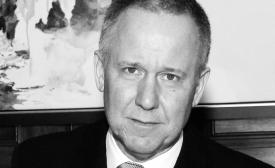organization of american states
Through its Petrocaribe initiative, Venezuela has sold discounted oil to energy-deficient clients, practically giving it away in some cases. Lately, however, that generosity has diminished with Venezuela's economic misfortunes, hastened by tumbling global prices for oil -- the country's only viable source of export revenues. Even Brazil, with a fraction of Venezuela's reserves, now pumps 25 percent more oil.
The coincidental timing of the exhibition at the OAS’s Art Museum of the Americas in Washington may have a healing effect: “In mounting this exhibit, we’re conscious of the value of artistic expression to communicate both the intentions and views of the artists and to speak more generally about social change and political engagement in the hemisphere,” said James M. Lambert, secretary for hemispheric affairs at the OAS.

CPD interviews the Secretary for Hemispheric Affairs at the Organization of American States.
Bogota’s public television station called on the Organization of American States (OAS) on Tuesday to intercede on its behalf amid threats to its executives, weeks after public appeals to Colombian national authorities.
As a result of the recent events that have taken place in Venezuela, the Organization of American States (OAS) and the Union of South American Nations (UNASUR) have both called for discussions. Venezuelan President Nicolás Maduro would like to see the conflicts resolved within the context of UNASUR and has rejected attempts by the OAS to address the situation.
The Organization of American States (OAS), the Mexican National Science and Technology Council (CONACYT) and the Mexican Agency for International Development Cooperation (AMEXCID) signed today at OAS headquarters in Washington, DC, an agreement to provide scholarship opportunities to 600 citizens of the Americas for master's or doctoral studies in science and engineering in Mexico, of which 100 will be earmarked for students from Central America and the Caribbean.
However, the United States is not currently in the best position to press these agendas due to Washington’s own flawed human rights record in Latin America and its age-old, persistent tendencies to try to dominate OAS machinery. Generating progress on issues ranging from corruption to drug-related violence at the OAS requires consistently investing political capital, which calls for vocalizing greater prioritization of the organization and demonstrating an eagerness to work in equal partnership with rising hemispheric powers.
Since international influence played a vital role in bringing about democracy in Thailand in 1992, inevitably it is interesting to know, what exactly are the ASEAN, US, UN and EU responses to the recent Thai crisis?







